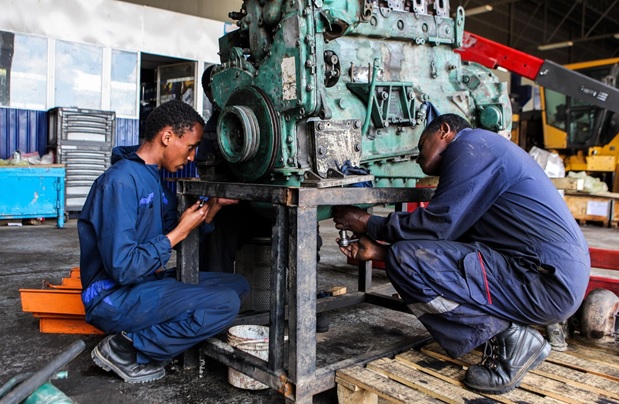
Manufacturing industry is among the sectors given great attention in the country’s economic reform. Following agriculture manufacturing is responsible for a large workforce. It has a potential to play a crucial role in the country’s economic growth and improvement of lives of its citizens. It can also play a significant role in the structural transition from agriculture to industry in the future.
Among the activities that have been given attention in the sector is the development of human resource. Beyond the manufacturing industry, the government, relevant institutions and the private sector are working together in this regard.
It is believed that manufacturing industries compete on a global scale based on their technology, their skilled and capable workforce that can produce quickly and in the required quantity. Sector experts say that in the absence of skilled workforce in the manufacturing industry, there is no productivity; without productivity, there is no competitiveness; without competitiveness, there is no capacity to continue growing.
In this regard, it is believed that technical and vocational education and training institutions play a crucial role in producing a workforce that makes manufacturing industries competitive. In order to further strengthen this role and to strengthen the linkages between industry and training institutions, the Ethiopian Press Agency and the Ministry of Labor and Skills jointly organized a discussion forum recently in Addis Ababa aimed at enabling the sector to make a significant contribution to the national economy.
In the second edition, third round of the about Ethiopia forum organized by the Ethiopian Press Agency, a wide-ranging discussion was held on issues that can enhance international competitiveness by empowering the workforce in the manufacturing sector.
The forum discussed issues related to increasing the capacity of the human resource and improving the efficiency of the manufacturing industry in a sustainable manner. According to the State Minister of Industry, Tarekegn Bululta, who presented keynote for discussion at the forum; the government is working on designing several programs to grow the manufacturing industry and improving operating systems.
The State Minister mentioned that the homegrown economic reform has been working on identifying five main sectors called the pillars of the economy of which one is manufacturing industry showing continuous progress. The manufacturing industry has recently entered into a full macroeconomic reform implementation and has solved the foreign exchange shortage that was a major bottleneck for the sector. The reform is attracting new drivers of the sector in addition to the existing ones.
He recalled that the growth of manufacturing sector in 2022/23 budget year did not exceed 7%; however, it was able to record a growth of 10.01% in 2023/24 budget year. This is an indication that the sector is growing and is recording promising results; and based on this, attention is being paid to recording a growth of more than 11% this budget year. In order to maintain this growth, the manufacturing industry is working to substitute the products that the country imports at high foreign exchange rates with domestic products and to produce a large workforce with developed skills in the sector.
The State Minister said; “The government has made major decisions in substituting imported products; especially, there is a significant change in import substitution through the activities taken to ensure that imported industrial products can be produced locally.”
Citing this as an example, he explained; “Security forces’ clothing used to be imported 100% is now fully produced domestically; the country has started talking about selling it to neighboring countries beyond its own consumption and there is a positive response.” This is a change that the government has achieved focusing on domestic production with commitment and putting direction that its institutions to buy from local industry.
Similarly, effort is exerted towards leather industry sector to produce quality and large-scale products and substitute import. Currently, efforts are being made to produce 100% of school shoes domestically. The government is also supporting the leather industry, considering the country’s vast livestock resources. This will make the country competitive in the world market as well, he said.
The State Minister noted that efforts are being made to produce packaging products locally, drawing on this experience. “The bag manufacturing industry, in collaboration with the Startup Agency and the Standards Institute, has signed an agreement to produce in a quality manner, and production has now begun,” he said, noting that this should be continued.
A skilled workforce is crucial for the economy to move in the right direction and achieve sustainable economic growth. As the manufacturing industry is key to economic growth, it should be supported by a skilled workforce. It should create job opportunities. Since developing the skills of the workforce is crucial for the growth of agriculture, tourism, mining and industrial sectors, the Ministry has developed an industrial capacity building strategy.
In this regard, although there are many unemployed youth in the country, few have the skills required by the manufacturing industry, the State Minister noted. “Despite continuous efforts to upgrade the workforce, there is a shortage of skilled labor in terms of the skills needed by the industry; the industry is not being adequately supplied with skilled labor.”
In addition to the manufacturer, the State Minister pointed out that there is a skill gap in the industrial leadership; “To grow the manufacturing industry in the desired way, it requires the development of skilled leadership.” It is important to know the nature of the sector; the time frame and quality required for industrial production. The Ministry has conducted a study on this issue and based on this, industrial capacity building work is being carried out.
He mentioned that the country’s economy has been based on import products, which has made economic growth not as sustainable as expected. The agricultural sector is contributing significantly to the economy, while the manufacturing sector’s contribution does not exceed 6%. This indicates that the manufacturing sector is performing very poorly compared to other sectors. In order to free the economy from foreign dependence, it is necessary to support the manufacturing industry, meet its needs, and work together.
Presenting a paper titled “What contribution can a skilled workforce make to a country?” at the forum, State Minister of Labor and Skills, Teshale Berrecha (PhD), emphasized; “The role of skills is significant in achieving our growth journey.”
He said, since the implementation of the homegrown economic reform, many skills-based projects have been implemented to address the economic imbalance. The supply-based system has been changed to demand-based to provide skilled citizens to industries.
The State Minister announced; various steps are being taken to ensure that the private sector contributes to the provision of skilled manpower. Technical and vocational education and training is job-oriented in nature; a legal framework has been prepared to work with the Ministry of Industry, the Ministry of Education and other stakeholders to make such training a reality.
A competent workforce means a workforce that is ready for work with its knowledge, skills, mindset and motivation. Efforts are being made to strengthen the linkages between industries and training institutions to produce citizens with the required skills while maintaining the quality of training.
He pointed out that more than three million citizens are being trained in short-term training in technical and vocational institutions, and more than 500,000 in regular training. However, the efforts and promotion work made to bring the quality of skills of professionals in the field are not believed to be sufficient.
He emphasized that attention should be paid to skill development and the respect given to professions and professionals. He particularly mentioned that skills are the main issue where new narrative is created. This will help correct the distorted narrations that arise related to professions and professionals.
In this regard, a new education system is being designed and implemented to maintain the quality of education that the country has experienced; one of the areas that has changed in this process is adjusting the content of technical and vocational training; for this, efforts are being made to modernize institutions, ensure a standard training system, and ensure the availability of qualified professionals, he said.
Minister of Labor and Skills, Muferiat Kamil, on her part, said; “Every manufacturing industry should work together to build the qualified workforce it needs” The Ministry is working to create a demand-based workforce; “There is indigenous knowledge that we as a country should cherish and protect in terms of skills development. Work is being done to identify and include 26 types of indigenous knowledge in the curriculum,” she said.
Muferiat further pointed out that work will be done to improve indigenous knowledge; this will play a significant role in respecting professions and professionals. There is a need to combine new and existing work sectors and strengthen start-up entrepreneurs. Ethiopia can be promoted when work is led by skills; “It is necessary to apply the knowledge available without any cost.”
BY BACHA ZEWDIE
THE ETHIOPIAN HERALD SUNDAY EDITION 30 MARCH 2025





